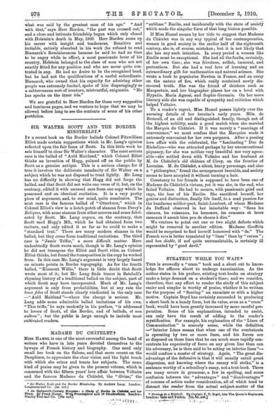SIR, WALTER SCOTT AND THE BORDER MINSTRELSY.*
IN a recant book on the Border ballads Colonel Fitzwilliam Elliot made certain suggestions which in Mr. Lang's opinion reflected upon the fair fame of Scott. In this little work he sets himself to clear Sir Walter's character. The most serious case is the ballad of "Auld Maitland," which Colonel Elliot thinks an invention of Hogg, palmed off on the public by Scott as a genuine antique. This is a serious charge, for if true it involves the deliberate mendacity of Sir Walter on a subject which he was not disposed to treat lightly. Mr. Lang has no difficulty in showing that Hogg did not forge the ballad, and that Scott did not write one verse of it, but, on the contrary, edited it with unusual care from one copy which he possessed and an identical recitation. It is a very pretty piece of argument, and, to our mind, quite conclusive. The next case is the famous ballad of " Otterburn," which in Colonel Elliot's view is a hotch-potch of stanzas from Percy's Beliques, with some stanzas from other sources and some fabri- cated by Scott. Mr. Lang argues, on the contrary, that Scott used Hogg's MS., which he had obtained from two reciters, and only edited it so far as he could to make a ". standard text." There are many modern stanzas in the ballad, but they come from traditional recitations. The third case is "Jamie Teller," a more difficult matter. Here undoubtedly Scott wrote much, though in Mr. Lang's opinion he did not transpose the Elliot and Scott roles, as Colonel Elliot thinks, but found the transposition in the copy he worked from. In this case Mr. Lang's argument is very largely based on minute points in Border topography. As for the fourth " Kinmont Willie," there is little doubt that Scott wrote most of it; but Mr. Lang finds traces in Satchel's rhyming history of a traditional ballad on the subject, part of which Scott may have incorporated. Much of Mr. Lang's argument is only from probabilities, but at any rate the bona fides of Scott stands clearly vindicated in the only case —" Auld Maitland "—where the charge is serious. Mr. Lang adds some admirable ballad imitations of his own. "This trifle," he says modestly in his preface, "is addressed to lovers of Scott, of the Border, and of ballads, et non aultres"; but the publics is large enough to include most cultivated readers.










































































 Previous page
Previous page